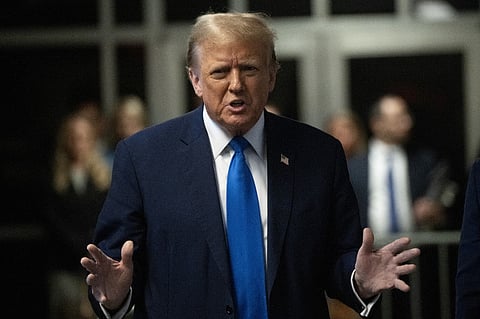US Supreme Court weighs Trump claim of 'absolute immunity'
The US Supreme Court was hearing arguments on Thursday on whether Donald Trump, as a former president, should be immune from criminal prosecution for acts taken while in office.
The ruling by the nation's highest court could have far-reaching implications for the extent of executive power — and Trump's multiple legal issues as he seeks the White House again.
And while most constitutional law experts expect Trump to suffer a legal defeat, he may already have scored a political victory.
By taking the case, the court's nine justices delayed — perhaps indefinitely — the start of Trump's trial on charges of conspiring to overturn the results of the 2020 election won by Democrat Joe Biden.
John Sauer, representing Trump, told the court that "without presidential immunity from criminal prosecution there can be no presidency as we know it.
"Every current president will face de facto blackmail and extortion by his political rivals while he is still in office," Sauer said.
Speaking to reporters in New York before entering a Manhattan courtroom for his hush money trial, Trump complained that the judge presiding over his case did not allow him to attend the Supreme Court hearing.
"I would have loved to have been there, I should be there, but this judge would not allow it to happen," the Republican presidential candidate said, adding that without immunity "you're going to become a ceremonial president."
The question of whether an ex-president is immune from prosecution is an untested one in American jurisprudence because, until Trump, no former White House occupant had been charged with a crime.
Special Counsel Jack Smith filed the election conspiracy case against 77-year-old Trump in August and had pushed for a March trial start date.
But Trump's lawyers filed a blizzard of motions seeking to postpone the case against him, including the claim that an ex-president enjoys "absolute immunity."
Two lower courts flatly rejected that argument but the Supreme Court agreed in February to hear the case.
'Unsupported by precedent'
One lower court ruled Trump's immunity claim is "unsupported by precedent" or the US Constitution.
"We cannot accept that the office of the Presidency places its former occupants above the law for all time thereafter," the judges said.
Nevertheless, Trump is hoping for a friendly hearing from a court he had a critical role in shaping, having appointed three justices to give it a 6-3 conservative majority.
James Sample, a constitutional law professor at Hofstra University in New York state, and other legal scholars said the high court was unlikely to hold that a president enjoys blanket immunity from prosecution.
"I find it hard to believe that even this very, very conservative, very pro-Trump Supreme Court will be inclined to find in favor of an argument that says a president is completely immune" regardless of his actions, Sample said.
"I think the scoreboard will read Jack Smith 1, Donald Trump 0."
Like Sample, Steven Schwinn, a University of Illinois Chicago law professor, believes the calendar would be of greater consequence.
"Even if the court hands Trump a decisive, unqualified defeat, the prosecution will have to scramble to get the trial before the (November) election," he said.
In addition to facing charges in Washington for conspiring to overturn the 2020 election, Trump faces similar charges in Georgia and has been indicted in Florida for allegedly mishandling classified documents.


